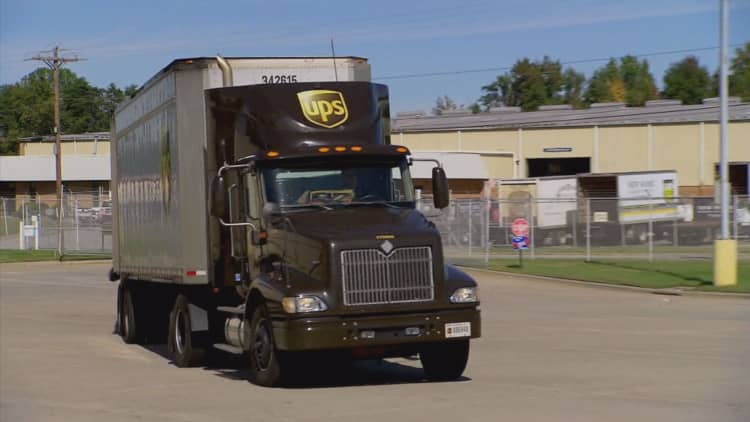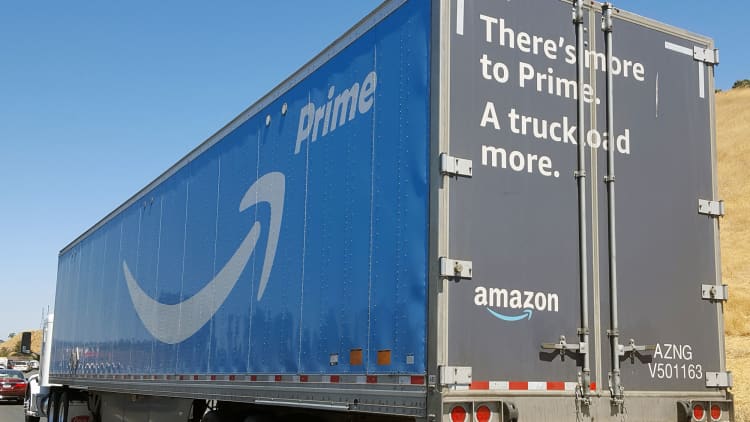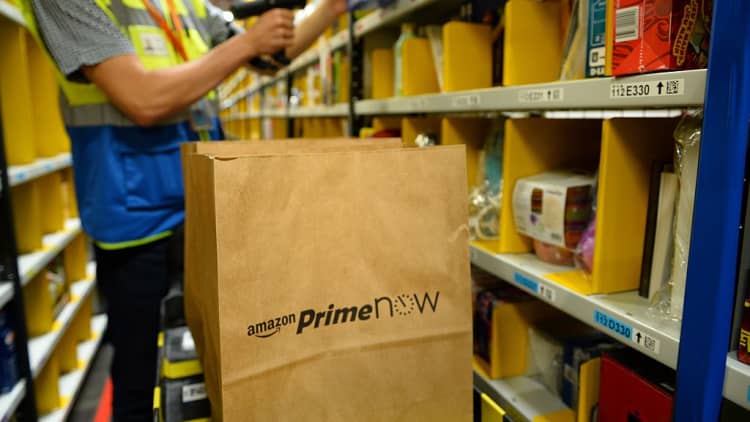Delivery company shares are dropping as investors worry Amazon is about to disrupt the industry.
Shares of UPS fell more than 0.7 percent Thursday. FedEx dropped as much as 1.6 percent before closing 0.1 percent higher.
Bloomberg News is reporting Amazon is trying out a new delivery program called "Seller Flex" where the company will pick up packages from third-party sellers selling on its platform and deliver the products to consumers.
Amazon clarified that the offering will continue to use some of its current delivery partners, but didn't comment on whether it will increase its own deliveries directly to customers.
"We are using the same carrier partners to offer this program that we've used for years, including UPS, USPS and FedEx," Amazon said in a statement.
One analyst believes a big expansion by Amazon into the delivery business is inevitable.
"Given the investments that Amazon is making in fulfillment infrastructure and transportation to support its own retail business, we view it simply a matter of time until they offer these services to third parties more broadly," Baird analyst Colin Sebastian wrote in an email. "This is the same strategy that Amazon has successfully utilized in retail (third party marketplace) and technology (AWS) where they offer as a service the same platforms built to run their business."
UPS has downplayed the Amazon disruption threat in the past.
"We don't believe that Amazon's strategy is to do it themselves and the reason we believe that is we have this huge infrastructure, we're investing in technology, we have a great mutual relationship with them," UPS CEO David Abney said in an interview with CNBC in December 2016.
But the Amazon disruption threat has been a worry popping up periodically on earnings conference calls with analysts over the last year for both FedEx and UPS.
FedEx on such a call in March of this year was asked about Amazon diving deeper into delivery. CEO Fred Smith signaled to analysts that his company may be less exposed to this risk than rival UPS.
"The vast majority of FedEx's business is business to business. Eighty-five percent-plus of our business has nothing to do with e-commerce," he said.
Smith continued:
"So Amazon's a wonderful company and they certainly have revolutionized the e-commerce world, and we're not sure what Amazon's going to do one way or another. But the FedEx system that consists of thousands of facilities and the ability to pick up, transport, and deliver in one to two business days between any two addresses in the United States has been decades in the making. And we think that we have not a great risk of being disrupted, to use the term."
The theory that FedEx is less exposed to this threat than UPS is apparent looking at the chart of both stocks versus the e-commerce juggernaut over the last five years. FedEx has posted strong returns, but UPS has actually trailed the market.
Amazon shares are outperforming the delivery companies again this year so far. The internet e-commerce giant is up 29 percent year to date through Wednesday versus UPS' 4 percent and FedEx's 19 percent returns. The S&P 500 is up 13 percent in the same time period.
This isn't the first time Amazon has made moves building out its own delivery offering. The Wall Street Journal reported in September 2016 the company was expanding its last-mile delivery services in major cities.
FedEx's Patrick Fitzgerald sent this statement in response to the report:
"We don't comment on speculative news stories but there continues to be reporting related to our networks and the transportation industry that demonstrates a clear misunderstanding of the scale, infrastructure and complexity involved in running a global transportation network. FedEx and other transportation providers are innovating as it relates to new services for e-commerce residential deliveries, but that is only one piece of the capabilities that we provide. Demand for our global portfolio continues to grow."
UPS also sent the following statement:
"Amazon is a valued UPS customer. We support all our customers with industry-leading ecommerce solutions and expect to expand these relationships further in the future. UPS continues to experience topline growth and margin enhancement driven by business-to-consumer volume growth and strong international expansion."



